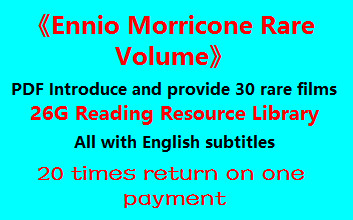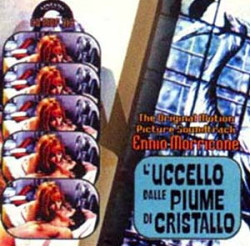L’UCCELLO DALLE PIUME DI CRISTALLO [THE BIRD WITH THE CRYSTAL PLUMAGE] (1970)
L’Uccello Dalle Piume di Cristallo – The Bird with the Crystal Plumage in English – is a horror-thriller film written and directed by Dario Argento, in his directorial debut. The film stars Tony Musante as Sam Dalmas, an American on vacation in Rome with his English model girlfriend (Suzy Kendall), who witnesses a woman being attacked in an art gallery by a mysterious assailant dressed in a raincoat. It soon emerges that the attacker might be a serial killer who is killing young women across the city; haunted by his brush with death, Sam teams up with a police inspector named Morosini (Enrico Maria Salerno) to try to help solve the crime. The film is widely considered to be the film which popularized the giallo genre among international audiences, and is the first installment in Argento’s Animal Trilogy that also includes Il Gatto a Nove Code and Quattro Mosche di Velluto Grigio.
This score is also notable as being the first collaboration between Argento and Morricone with Argento as director, and for the fact that is represents one of the most challenging explorations of dissonance and musical abstraction of Morricone’s career. The score is essentially split into two halves; the first comprises a set of lounge jazz and light pop pieces that represent 1970s Rome and Tony’s experiences in it. “Non Rimane Piu Nessuno” is alternately fun and lively, and laid back and relaxing, and has a light bossa nova beat. The conclusive “Violenza Inattesa” is warm, almost pleasant piece for wordless vocals, light rock guitars, and glassy percussion.
The second deals with the murder and mayhem, the horror and suspense at the center of the plot, and this is where Morricone gets really wild. “Corsa Sui Tetti” is a vivid collision of jazz drums, muted trumpets, frantic keyboards, tolling bells, and various other assorted noises that have to be heard to be believed. “Svolta Drammatica” adds insistent, trembling strings into the mix. “Frasseggio Senza Struttura” and “La Citta Si Risveglia” are extended exercises in minimalist tension-building, again using glass and metallic sounds as a topical marker. “Silenzio Nel Caos” adds whining jazz saxophones to the palette, as well as low male voice grunting and disturbing female ululations.
Then there is a final overarching idea that runs through both halves of the score, and that is the sound of Edda dell’Orso having an orgasm into a microphone. Her wild, agonizing moans and groans represent the underlying sexuality that Argento injects into the entire film. It begins in the opening cue, “Piume di Cristallo,” which is a pretty lullaby-esque piece featuring la-la-la vocals, wind chimes, vibraphone, and organ. She can be heard gasping breathlessly in “Corsa Sui Tetti,” and quivering erotically in “Svolta Drammatica,” before climaxing (pardon the pun) in the astonishing title track “L’Uccello Dalle Piume di Cristallo,” which is literally nothing more than vocal sex noises and a heartbeat pulse that gradually quickens and quickens. Oh, yeah, there’s also an Italian drinking song (“Se Sei Stonato”), if you perverts are into that sort of thing.
In my opinion the best presentation of the score for The Bird with the Crystal Plumage is the 1998 release on Italian label Cinevox, which presents everything the score has to offer without you having to wade through six variations of every theme. There are other albums which offer slightly different presentations, and of course the main theme has been included on many Morricone compilations over the years. This one comes highly recommended as a groundbreaking work for an important landmark film in Italian giallo history.
Track Listing: 1. Piume di Cristallo (5:12), 2. Non Rimane Piu Nessuno (3:17), 3. Corsa Sui Tetti (4:59), 4. Se Sei Stonato (0:48), 5. Svolta Drammatica (2:43), 6. Frasseggio Senza Struttura (4:16), 7. La Citta Si Risveglia (3:09), 8. L’Uccello Dalle Piume di Cristallo (1:25), 9. Silenzio Nel Caos (2:12), 10. Violenza Inattesa (4:08), 11. Frasseggio Senza Struttura – Alternate Version (2:26), 12. Piume di Cristallo – Alternate Version (2:08). Cinevox MDF-313, 36 minutes 43 seconds.












